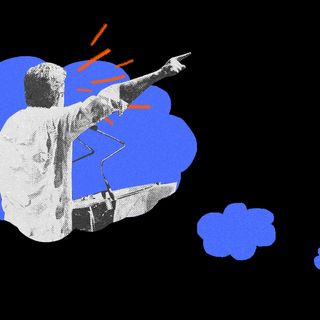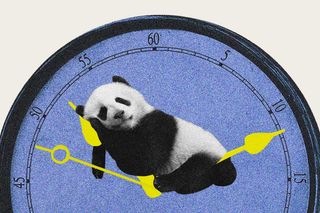
Does ‘Laziness’ Exist? Research Says, It’s Complicated
We’ve lost sight of what laziness really is, why we demonize it, and if it exists beyond being a manifestation of our anxieties.

Lazy is an adjective of disdain. Lazy employees are bad employees; lazy people are unambitious; lazy friendship is undeserving; lazy love is a red herring. Anything and anyone lazy instantly is condemned to take on the mantle of the self-indulgent, idle figure who deserves judgment for their choice of picking languor over productivity. Sloth is sin, we’re told.
But somewhere between “I’m feeling lazy to work” and “lazy Sundays,” we’ve lost sight of what laziness really is, why we demonize it,and if it exists beyond being a manifestation of our anxieties. Ask yourself what it means to be lazy. Do you think of someone who barely does anything? Or who does things albeit slowly? Maybe one who does nothing? Perhaps, someone who doesn’t desire to do anything, at all? Each question leads to a rabbit hole different and deep, compelling people to further scrutinize ideas of work culture, capitalism, social forces, human fallibility, and fatigue.
Laziness intrigues the human mind because we’ve been cautioned against its dark charm. A more interesting question to ponder here is if laziness actually exists, and if anyone can be intrinsically lazy.
It helps to pivot attention to literature on laziness. Laziness may figure as a concept if we understand it to mean someone who does nothing or is slow. Psychiatrist Neel Burton interprets an evolutionary reasoning: “Today, mere survival has fallen off the agenda, and, with ever-increasing life expectancies, it is long-term strategizing and effort-making that leads to the best outcomes. Yet, our instinct, which has not caught up, is still for conserving energy, making us reluctant to expend effort on abstract projects with distant and uncertain payoffs,” he wrote. This idea creates two categories of people and disrupts how we’re primed to think about laziness: those who are ambitious and have the perspective of the future, and those who are “instinctually” programmed to focus on self-preservation.
This theory also served as the basis of a 2018 study, showing how people may just be wired to prefer relaxation over physical activity. “Conserving energy has been essential for humans’ survival, as it allowed us to be more efficient in searching for food and shelter, competing for sexual partners, and avoiding predators,” the authors said. Their research meant to explain why people would choose to not exercise even when they were made aware of the health risks; the answer they found was that brain activity in itself nudges people toward a sedentary lifestyle.
By juxtaposing “activity” and “ambition” with “conserving energy,” laziness in popular imagination then refers to an inertia — both physical and mental. This feeds into ideas that laziness is for the weak and unsuccessful; an excuse for not being competent or talented enough.
Related on The Swaddle:
Why the Cult of ‘Doing What You Love’ Is Losing Steam
It’s helpful to debunk this imagination. What if one simply doesn’t want to adhere to mainstream ideas of competence, talent, or success? Does that mean they don’t do anything?For one, people are simultaneously wired to detest doing “nothing” too. In theory, we understand that any mental and physical strain is tedious; opting for the low-hanging fruits is convenient and comforting, so the logical next step is to take the path of least resistance. This is what Zipf’s Law — also called the “principle of least effort” — dictates too. Take John Atanasoff, who built the first electronic digital computer; he famously did it because it was too much work and too much time to perform calculations manually.
But in practice, a study found just how many times people do things they don’t really need to, even things that require more work and are painful. “Sometimes we take the easy route and do as little as we can get away with, but at other times we value situations more if we have to expend considerable effort. The intrinsic joy of the effort gives us so much pleasure that we don’t take the shortcut. We might spend hours puzzling over a cryptic crossword instead of using a search engine to find the solution,” explained Claudia Hammond in BBC. This is what some experts also call the paradox of effort. Even behavioral economist George Loewenstein has arguedthat people will go to all sorts of lengths to do things, and achieve goals, even when they don’t need to.
What this tells us is that at every point in time, people recalibrate which decisions require effort, and which don’t. Which are valuable, and which aren’t. Tenacity is learned and then expended at each juncture, so laziness as a catch-all term for the things that capitalism mandatesmay not quite apply.
In theirbook, social psychologist Devon Price calls for a re-examining of the “laziness lie”— which falsely tells us we are not working or learning hard enough. Others have also called it a myth. A study in 2015 showed that people who are physically less active tend to be brainier than physically active people. They carry a “need for cognition,” and would instead pursue activities that speak to the mind and brain more than anyone’s ideas of effort. Moreover, what we perceive as laziness may be the other person taking time to think and innovate, a 2018 study argued.
Related on The Swaddle:
Why People Living With ADHD Are Often Misjudged As ‘Lazy’
Two, laziness cannot be understood without contextualizing people’s actions with dominant factors, such as their socioeconomic standing, behavior, personality, and upbringing. Think of laziness as a black hole — It swirls around ideas of productivity and expectations, absorbing people’s presumptions about what someone should be doing and how fast. But rarely ever does the black hole truly reveal the cultural and social particles that compel people to be lazy. There is an intimate association between perceptions about laziness and failure, which feeds into apathy for socio-economically vulnerable sections of society. People are poor because they just aren’t doing enough. Theirs is a “choice mindset” according to some; that if people want, they can do everything, and thus emerge glorious. This reading of laziness then also ends up with people justifying social inequality.
But this tone-deaf belief overlooks the structural inequalities of poverty, disease, and caste that shape much of the economic injustice. Some people can’t choose effort and work due to neurodivergence or different health conditions; some people are systemically excluded from approaching work and economic benefits; some people’s effort may not be articulated in the narrow definition of “productivity” and could easily be dismissed as laziness. Yet still, some people may not want to work as a natural response to an overwhelmingly fraught world. It is mere human fatigue. Would you call it laziness?
Arguably, laziness exists in other ways outside of the work culture. One exists in terms of gendered divisions of labor in the home, when men get out of the equitable distribution of household labor citing their incompetence. Called “strategic incompetence,” this means “men don’t just ‘pretend’ to not be able to do something, they ‘deliberately mess up’ the task — like ‘ruining the laundry, leaving grease on the dishes, or ignoring the children’ — so they’re never asked to do it again,” wrote Devrupa Rakshita for The Swaddle.
This is not only a rethinking of how we understand laziness and use that lens to critique its existence. Instead, we must make peace with knowing that laziness will forever continue to sit somewhat uncomfortably with capitalistic expectations and human nature. Some may still vociferously argue that people are lazy and make a case for success; others may not make the effort to justify their perceived stasis. Better still, we can radical reimagine our ideas around effort and work — how we measure them, how we interpret them, and if at all, there’s a fallacy in how we see them.
Saumya Kalia is an Associate Editor at The Swaddle. Her journalism and writing explore issues of social justice, digital sub-cultures, media ecosystem, literature, and memory as they cut across socio-cultural periods. You can reach her at @Saumya_Kalia.
Related


Some Tropical Viruses Make People Smell ‘Tastier’ to Mosquitoes, Finds Study
